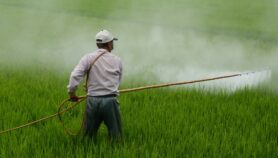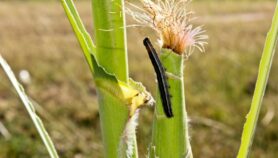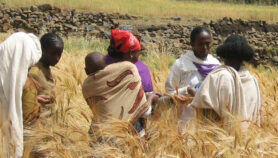Send to a friend
The details you provide on this page will not be used to send unsolicited email, and will not be sold to a 3rd party. See privacy policy.
[ABUJA] In a bid to tackle widespread vitamin A deficiency, particularly among pregnant mothers and young children, Nigeria has released two fortified maize hybrids for use in agriculture.
The hybrids — developed by Nigeria’s International Institute of Tropical Agriculture (IITA) and research partners — contain 75 per cent more beta-carotene (a substance that can be converted to vitamin A in the body) than the common commercial maize hybrid marketed in Nigeria.
The vitamin A-rich varieties, ‘lfe maizehyb 3’ and 4 — which were produced by conventional breeding techniques — were released last month (4 July) by the National Variety Release Committee of Nigeria.
Abebe Menkir, a leading IITA maize breeder, told SciDev.Net: "Pro-vitamin A is converted by the body into vitamin A when the maize is eaten. The common maize cultivars grown by farmers contain low levels of pro-vitamin A in their grains".
The two hybrids, Menkir explained, have high yield potential, desirable agronomic traits, and some resistance against the major diseases prevalent in Nigeria’s lowland savannas.
The IITA is working closely with private seed companies in Nigeria to produce good quality seed for use by smallholder farmers.
Rose Gidado, a nutritionist and coordinator of the Open Forum on Agricultural Biotechnology in Africa (OFAB), said the new hybrids will provide vitamin A to groups in Nigeria who are particularly vulnerable to vitamin A deficiency, especially pregnant women, lactating mothers and children under 5.
According to the WHO, between 250,000 to 500,000 children in the developing world go blind each year due to vitamin A deficiency, and around half of these die within a year of becoming blind. Nigeria has one of the highest risks of vitamin A deficiency in the world.
Bamidele Solomon, director-general of the National Biotechnology Development Agency (NABDA), Abuja, said the new maize varieties would speed Nigeria’s quest to improve Vitamin A sufficiency.
"The government has said that all food and flour should be fortified with Vitamin A by flour producers," he said. "With the new varieties, it will be much easier as the vitamin is now in the grains" — thus eliminating the need to add the supplement later on in the food production process.
Elsewhere, a vitamin A-rich variety of sweet potato has proven successful in a trial of malnourished women and children in Uganda by HarvestPlus, part of the global agricultural research partnership CGIAR. The orange-fleshed potato, created by cross-breeding white and yellow sweet potato varieties, is higher yielding, drought-resistant and rich in beta-carotene. The work was published in the Journal of Nutrition this month.
References
Journal of Nutrition doi:10.3945/jn.111.151829 (2012)













